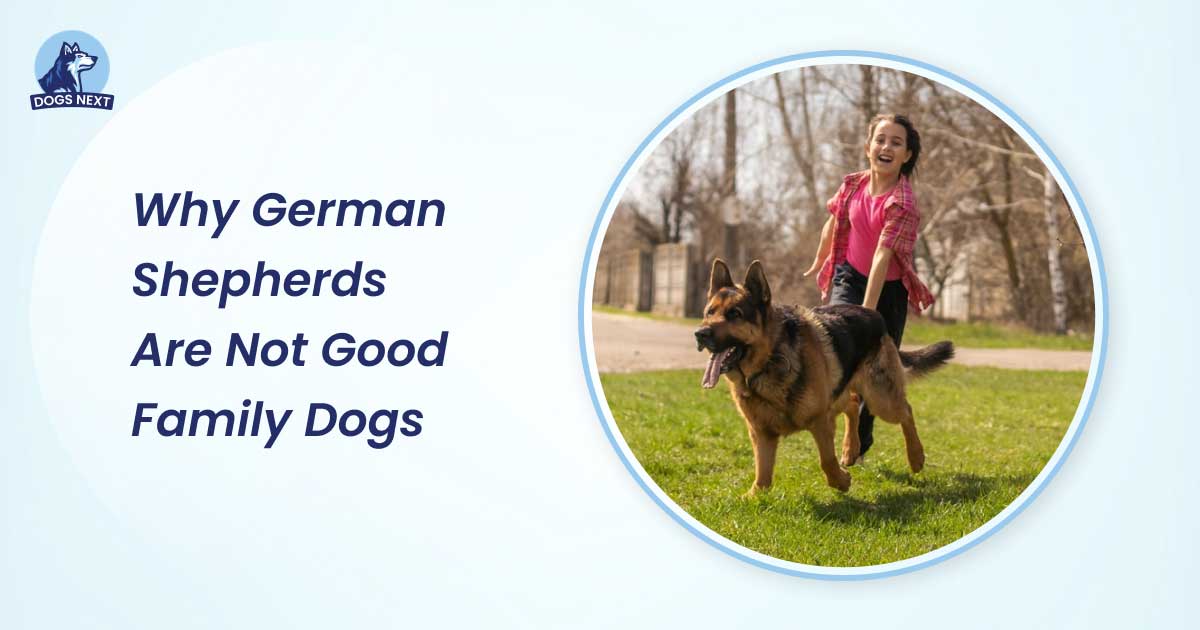German Shepherds may not be ideal family dogs due to their high energy levels and strong guarding instincts. They need extensive training and socialization.
German Shepherds are intelligent and loyal, often excelling in roles such as police or service dogs. Their high energy and strong guarding instincts can make them challenging for families. These dogs require extensive training and socialization to behave well around children and strangers.
Without proper guidance, they may become overprotective or aggressive. Their need for physical and mental stimulation demands a lot of time and effort. Families with young children or those with limited time for training may find it difficult to meet the needs of a German Shepherd. Proper care and attention are crucial for these active and intelligent dogs.
High Energy Levels And Exercise Needs
German Shepherds, known for their intelligence and loyalty, often require significant care and attention. One critical aspect to consider is their high energy levels and exercise needs. These active dogs thrive on physical and mental stimulation, making them a less-than-ideal choice for families who can’t meet their demanding exercise requirements.
Daily Physical And Mental Stimulation
German Shepherds are an active dog breed, requiring extensive daily physical and mental stimulation to stay healthy and happy. Without proper exercise, they can become bored and develop behavioral issues.
- Physical Exercise: German Shepherds need at least 1-2 hours of vigorous activity each day. This can include running, hiking, and playing fetch.
- Mental Stimulation: These intelligent dogs also need mental challenges. Puzzle toys, obedience training, and agility courses help keep their minds sharp.
Providing this level of stimulation can be time-consuming. Families must commit to regular walks, play sessions, and mental exercises. Failing to meet these needs can lead to destructive behaviors such as chewing, digging, and excessive barking.
| Type of Stimulation | Examples | Time Required |
| Physical Exercise | Running, Hiking, Fetch | 1-2 hours daily |
| Mental Stimulation | Puzzle Toys, Training, Agility | 30-60 minutes daily |
Challenging For Families Who Can’t Provide Regular Exercise
Meeting the exercise needs of a German Shepherd can be a challenge for many families. Busy schedules and limited space often make it difficult to provide the required activity levels.
Families with young children or hectic lifestyles may struggle to keep up with the demands of such a high-energy dog. Here are some common challenges:
- Time Constraints: Families may not have the 2-3 hours daily needed for exercise and mental stimulation.
- Space Limitations: Apartments or homes without large yards may not offer enough room for these active dogs.
- Consistency: Regular and consistent exercise is crucial. Sporadic activity levels can lead to frustration and behavioral issues.
For families unable to dedicate this time, adopting a German Shepherd might not be the best choice. Consistent high-energy dog care is vital for managing active breeds like German Shepherds. Ensuring they get the necessary exercise and stimulation is crucial for their well-being and overall happiness.
Strong Protective Instincts
German Shepherds are known for their strong protective instincts, which can make them a challenge as family dogs. While their guarding behaviors in dogs are beneficial for security, they may not always be suitable for a family setting. Understanding these protective dog traits is essential for potential owners.
Highly Protective
German Shepherds are highly protective. This quality comes from their background as working dogs. They were bred to guard and protect. Their protective dog traits make them excellent at keeping intruders away.
These dogs have a natural tendency to guard their home and family. They can be very alert and often bark at strangers. This can be good for security but might be a problem in a family environment. Here are some reasons why:
- Constant vigilance: German Shepherds are always on the lookout. This can make them anxious around new people or situations.
- Overprotective behavior: They may see friends or family members as threats. This can lead to aggressive behaviors.
- High energy levels: They need a lot of exercise and mental stimulation. Without it, they can become bored and destructive.
These traits can create challenges in a family setting. It’s important to understand that while their protective nature is a plus for security, it can be a minus for a peaceful family life.
Cause In Family Settings
In a family setting, German Shepherds’ strong protective instincts can cause issues. Their guarding behaviors in dogs are often too intense for a typical home environment. Here are some challenges families may face:
| Challenge | Description |
| Stranger Anxiety | German Shepherds may not welcome visitors. They can become anxious and aggressive. |
| Child Safety | These dogs might see children’s friends as threats. This can lead to unintended aggressive actions. |
| Socialization Needs | They need extensive socialization to accept new people. This can be time-consuming and challenging. |
These family dog challenges can be managed but require effort. Owners need to invest time in training and socializing their German Shepherd. This involves consistent exposure to new people and situations. The goal is to reduce their overprotective behavior.
Families must also be prepared for the dog’s high energy levels. Regular exercise and mental activities are crucial. This helps in managing their guarding behaviors and keeping them happy. Understanding these needs is key to making a German Shepherd a better fit for family life.
Training And Socialization Requirements
German Shepherds are often praised for their intelligence, loyalty, and versatility. However, they might not be the best choice for families due to their specific training and socialization requirements. Understanding these requirements is crucial for anyone considering this breed as a family pet.
Training Requirements For German Shepherds
German Shepherds need rigorous training. They are intelligent and energetic, requiring consistent and structured training. Without proper training, they can become disobedient or even aggressive.
Training sessions should be daily and start at a young age. Basic commands like sit, stay, and come are essential. Advanced training might be necessary to manage their high energy levels and intelligence.
Dog Training Challenges
Training German Shepherds can be challenging. They are strong-willed and may test boundaries. Patience and persistence are key to effective training.
Families with busy schedules might find it difficult to dedicate the necessary time. Inconsistent training can lead to behavioral issues.
Dog Socialization Needs
Socialization is crucial for German Shepherds. They need to be exposed to various environments, people, and other animals from a young age.
Without proper socialization, they can become fearful or aggressive. This can be a significant issue in a family setting.
Socialization For Family Dogs
German Shepherds need extensive socialization to adapt well to family life. They should be introduced to different family members and other pets gradually.
This process requires time and effort, which can be challenging for busy families.
Table: Training And Socialization Requirements
| Aspect | Requirements |
| Training Frequency | Daily |
| Training Type | Basic and Advanced |
| Socialization Exposure | Various Environments, People, Animals |
| Socialization Start Age | Early Puppyhood |
Frequently Asked Questions
Are German Shepherds Aggressive With Children?
German Shepherds can be protective, which might seem aggressive. Their strong guarding instincts can be misinterpreted. Proper training and socialization are crucial.
Do German Shepherds Require Constant Supervision?
Yes, German Shepherds need supervision, especially around kids. Their high energy and protective nature demand consistent monitoring.
Are German Shepherds High-maintenance Pets?
German Shepherds are high-maintenance due to their grooming needs and exercise requirements. They need regular mental and physical stimulation.
Can German Shepherds Adapt To Family Life?
German Shepherds can adapt but need training and socialization. Their strong-willed nature may pose challenges without proper guidance.
Conclusion
German Shepherds may not be the best choice for all families. Their high energy and protective nature require experienced handlers. Consider your lifestyle before adopting. Proper training and socialization are essential. Make an informed decision to ensure a happy home for both you and your dog.

I’m David, an expert contributor and writer, with two furry friends of my own, I know the challenges of raising and caring for dogs. From training to nutrition and health, my goal is to provide valuable insights and advice to help create strong bonds and happy, healthy lives. Find me in Twitter.



